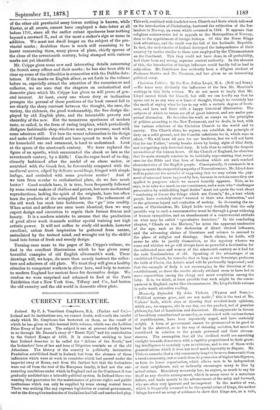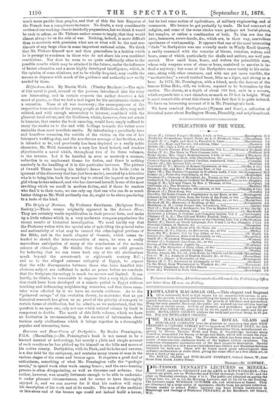Monarchy Defended. By John Vickers. (Wyman and Sons.)— "Political systems
grow, and are not made ;" this is the text of Mr. Vickers' book, which aims at showing that revolutionary opinions, which are, we suppose, rife in our day, are the product, not of genuine philosophy, but of fanaticism and discontent. His arguments in favour of hereditary constitutional monarchy, as contrasted with various forms of republicanism, have been repeatedly urged, and have certainly weight. A form of government cannot be pronounced to be good or bad in the abstract, as is the way of debating societies, but must be considered in relation to the people governed and their circum- stances. The assumption that all the civilised world are marching straight towards democracy with a rapidity proportioned to their grow- ing intelligence is certainly open to criticism, and is one of those wide generalisations which it does not need much ingenuity to dispute. Mr. Vickers remarks that a city community is apt to be more democratic than a rural community, not so much from its possession of higher intelligence, as from its lower organisation, which allows mon to be independent of their neighbours, and so indirectly encourages many to live by actual crime. Hereditary monarchy has, he argues, as much to say for itself as any elective arrangement, which in many cases is a notorious failure, and leads merely to the advancement of the noisy and forward, who are often very ignorant and incompetent. In the matter of war, which is frequently assumed to be the special crime of kings, the author brings forward an array of evidence to show that kings are, as a rule,
much more pacific than peoples, and that of this the late Emperor of the French was a conspicuous instance. No doubt, a very considerable section of our working-class is decidedly pugnacious, but we think it would be rash to affirm, as Mr. Vickers rather seems to imply, that they would almost always be on the side of war. Nothing, indeed, is more difficult than to ascertain with precision what are or what will be the real sen- timents of any large class in some important national crisis. We think that Mr. Vickers himself now and then generalises in a fashion which he is prompt to condemn in those who do not share his own confident convictions. Nor does ho seem to us quite sufficiently alive to the possible results which may be attained in the future, under the influence of better education and a more highly developed intelligence, which, in the opinion of some thinkers, not to be wholly despised, may enable the masses to dispense with much of the guidance and authority now really needed by them.































 Previous page
Previous page